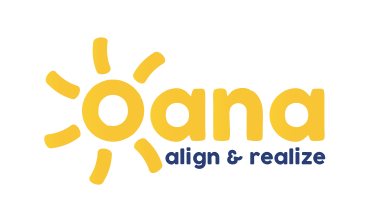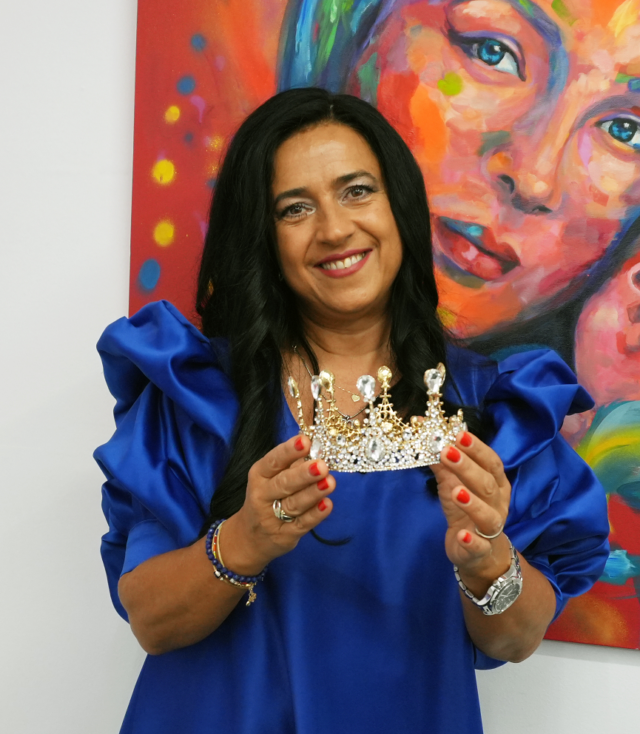Oana Nastase
Brief presentation:
Oana is currently a coach, mentor, consultant.
Is a memberUm ICF Romania ANDi Austria, with the specialization Holistic Coach for Career, Life and Leadership, with PCC accreditation – Certified Professional Coach.
Her coaching experience and consultant covers:
- Corporate managers who are at various stages of hierarchical growth or career transition
- Entrepreneurs who want to bring more efficiency and performance to their company, limit conflicts, and bring more cohesion to the team
- Freelancers or entrepreneurs in the start-up stage, who want to clarify their mission, vision, values, objectives, target customers, communication channels and the most effective communication methods
- Teachers who need to increase their communication and leadership skills
- People interested in their own evolution, in overcoming their own limits, in improving relationships with colleagues, managers, clients, life partners or their families.
As a facilitator for teams or groups he has worked:
- with teams from companies to update the mission, vision, values, objectives and align with them; for conflict management, increasing communication and influencing capacity
- with teams of teachers to increase collaboration through leadership and communication skills
He is a mentor. since 2013 within the Professional Women Network Romania, since 2021 within the PWN Austria, since 2019 within the Asebuss Alumni Association.
In 2016 he received the "Mentor of the Year" award.
Previous business and NGO experience:
- Between 2009 and 2018, he was a social entrepreneur and NGO leader, founder and organizer of the Bucharest Marathon, the Bucharest Half-Marathon, the largest street running events in Romania.
- He has 12 years of management experience as director of communication and corporate affairs at Rompetrol Group, Bucharest Stock Exchange or development director at Forum Invest.
In 2015, he became an expert and consultant for communication and institutional relations at the World Bank - Romanian office.
Interview with Roxana Melnicu – Oana Nastase
How did you get into coaching and what training did you take? Who teaches these courses (in Romania and abroad) and what types of practices do they open you up to?
Coaching came as a natural continuation of my inclination towards personal development, continuous career and life training, personal evolution. I started my first ontological courses (ontology is the study of the human being) in 1999. I became a trainer in that technology. Then I got my accreditation as a trainer and trainer of trainers.
I took leadership, facilitation, and training courses.
In 2013 I started working as a mentor.
During the pandemic, I also took the exams for international coaching accreditations, the first two levels out of 3: ACC – "accredited coach certification" for which, in addition to courses from an accredited school that last 6-12 months, you need to demonstrate 100 hours of practice; and the second level – PCC – "professional coach accreditation" requires courses from an accredited school – lasting approximately 1 year – and the demonstration of 500 hours of practice.
These schools are accredited by ICF – International Coaching Federation.
Every coach must renew their accreditation every three years and take courses to continuously develop.
I have taken different courses, most of them in the Anglo-Saxon and American system; the last ones were from an American school in New York, with a holistic approach – Goal Imagery Institute.
I believe that every aspect of life is interconnected and influences the other aspects. Hence the desire to approach the human being as a whole, understanding the levers that motivate us, push us forward or block us in our career, business, team leadership, personal life, relationships, family.
What does a coach do and what doesn't he do?
A coach is a trainer of mind and soul. Initially, "coach" was the name of the cart/carriage that took you from point A to point B; then the coachman was assimilated with the name "coach". In the last 100 years, the coach was the trainer of athletes, he physically trained other people. And in the last 40-50 years, the profession of coach began to develop - as a trainer of mind and soul.
Currently, coaching is most commonly used in companies, within the organizational framework, to increase performance.
I work individually or with teams for team cohesion, alignment with values, mission, company vision, conflict management, communication, influencing, leadership, collaboration and accountability.
What does a coach do that a psychologist doesn't?
A coach works with solutions, brings the perspective of the desirable future to the client's consciousness, challenges them to imagine new perspectives compared to those already known, helps them set goals, make action plans, stay anchored in them, and measure their achievement.
Coaching is about the future, about awareness through conversations and questions, in which the coach does not give solutions, does not give advice, but creates a space of trust, power and creativity so that the client can understand, become aware of, explore their own options and choose the optimal one for the present stage of their life.
The psychologist works especially with understanding and possibly healing the past, with traumas, with fears, with blockages. Psychologists approach clients gently, indirectly, therapy can last many months or even years.
Coaching has more effective tools that help unlock and achieve faster results. It positions the client as the cause, as the creator in their life; it helps them set themselves on a trajectory that empowers them, inspires them. Coaching uses more direct conversations and has results in a shorter time.
What does a coach do and not do in a self-development course?
In a course, we most often find out some information, maybe we learn something new, maybe we repeat and memorize something new, something useful.
The courses are addressed to a group of people so the solutions are somewhat more general, valid for all participants.
In coaching you work 1 on 1 most of the time. Even when facilitating for teams, it is recommended to work individually with team members. Each person is listened to and treated with respect for their individuality, with their personal specificity; the solutions found are personal and personalized.
In addition, it's about experimenting, about opening conversations that take you directly inside your own being, in which you experience thoughts, emotions, situations that leave an imprint and act as a lever for change.
It's the difference between reading a romance novel and falling in love. Maybe by reading, learning, going to classes you understand many concepts. But personal coaching experience changes you, takes you to another level of awareness.
What does a coach do that a good friend doesn't do?
A good friend listens to you, maybe gives you advice, maybe empathizes with you; most of the time good friends keep us stuck in the problem we are facing, because they "agree with us", "understand us", they ally with us when we blame "that wretch who did to me... or didn't give me... or wronged me" and we remain in an area where we blame others, circumstances, boss, colleague, husband, child, mother-in-law, parents, society, pandemic, war, etc. This is the area of lack of power. It is the area of resentment and bitterness. Maybe the conversation is comforting for the moment but it leaves you in the position of a victim of circumstances.
Whenever you feel the need to complain and have someone understand you, you go to a friend. This can keep you going in circles for months or years.
If you have the courage to work with a coach, he will be like a mirror to you. You may not like what you see at first, but we know that "the truth will set you free." The coach does not agree with you, nor does he give you advice or solutions; he challenges you to look at things from different perspectives until you understand your situation with all its implications and engage in the fight to break out of the vicious circle and transform it into a virtuous circle. The coach challenges you to position yourself as the cause in your life, to create something that inspires you, going through a process of transformation. Transformation can be painful but it is liberating, it is access to personal freedom, to authentic self-expression through responsibility.
Who needs and who doesn't need a coach?
Personally, I believe that everyone needs a support system, experienced, trustworthy people to be their guides, coaches, and help them realize and fulfill their potential. Why would you look for new solutions, paths, and more evolved perspectives on your own if in a relationship with a coach it is faster, more efficient, easier, and maybe more fun?
Working with oneself is, in my opinion, a priority for any person who is interested in evolving, harmonizing, and reaching and fulfilling their potential.
If every person takes care of their physical appearance - they wash, comb, take care of their clothes, allocate time and energy daily for their external appearance; I wonder, for the mind, thoughts, beliefs, emotions, inner world how much time do they allocate? Doesn't the inner world give you access or not to a certain level of quality of life, no matter how good-looking you look on the outside? And why do we neglect it so much? Why do we ignore it completely?
One answer is – because of the human ambivalence or dichotomy in which we constantly run away from suffering and eternally seek pleasure. And putting the spotlight on ourselves can bring discomfort, suffering, pain. The good news is that they can be short-lived and what lies beyond the discomfort is sweet, harmonious and liberating. Awareness, acceptance of one's own being with what it has and what it does not have, with what it has done and what it has not done leads to personal flourishing, to living life to the fullest, to having access to fulfillment and not only to pleasures and satisfactions.
What has your coaching experience taught you?
It really is a continuous learning process. Every person I work with opens up new themes and challenges for me. I also learn about myself while guiding or training them.
I believe in authenticity, in experience, in living, demonstrating and manifesting what you preach.
In this sense, I strive to personally realign myself to be congruent, articulate in front of the people I work with. My slogan is “align and achieve”. This forces me to analyze my slippages and to gather on the path of personal alignment. (Re)construction, personal reinvention begin with personal awareness and alignment: to align my thoughts, emotions, words, and deeds. Only in this way can I have coherence with myself and only in this way can I generate coherent, harmonious relationships with others. And this is permanent work, it never ends. We humans are like onion sheets – when we peel off one layer, a new one appears underneath. And if we interrupt training, rust and laziness settle in. Like when you take a long break from exercising; you procrastinate with the excuse that you have done this before and succeeded. But procrastination costs you extra pounds, mobility, and flexibility.
What kind of people ask for your help?
I work individually especially with career women, successful, managers, entrepreneurs, freelancers, mature women, with families or who want a family. I attract the kind of people who somehow mirror me, who believe that I have taken a few steps more than them and can guide them to reach their goal on paths similar to those I have taken. The second group in individual work is made up of young people, often the adult or teenage children of the ladies I have worked with. They are looking for the right path in their studies, in their careers.
In the business area, I work mostly with teams from entrepreneurial companies and with the entrepreneurs themselves - maybe because I'm credible; I also built an organization from 0 and it reached a turnover of 3 million euros in cash and 5 including goods and services.
I also work with teachers on communication and leadership skills. I believe strongly in training teachers to be permeable, open, authentic, good communicators, good leaders who can set an example and inspire both their colleagues in the office but especially the children and young people they train for life.
What kind of people do you think would need your help and don't ask for it, out of ignorance, pride, or other reasons?
People from the same group as above. Also successful, mature women, entrepreneurs or managers who are in various blockages, moments of transition, career changes or relationships; it would be more useful to leave embarrassment, prejudices, attachment to a blunted identity and an eroded ego aside and to see their interest in getting out of a blockage faster or achieving their goals at a higher speed. I think it's good to attract people who somehow find themselves in me. From this mirroring, trust is also built, which is essential in the coaching process.
What is it like to be a coach in Austria compared to Romania?
In Austria, everything is more organized, more structured, more procedural. Austria is the country of systems that make the entire /country/communities function. It is the country of rules and procedures that are not discussed but are applied without questions or comments. People have a more predictable, more linear life than Latins or Balkans. They have segmented their needs according to social organization: they behave civilized, do not discuss personal problems or express their emotions, especially if they are negative, so that they are not put in the position of having negative emotions poured into their heads by anyone; many have lost the ability to be themselves, to be authentic, to have critical thinking. They display perpetual optimism. When the knife reaches their bone, they call on specialists – coaches or therapists – depending on the situation. There they pour out their worries, fears, and hardships so that once they go out into society, they can return to the politeness and political correctness of respectful dialogue. As a rule, business coaching is completely separate from life coaching. For the former, you must have a business degree in addition to your coaching degree; for the latter, you must have a psychology degree in addition to your coaching degree.
Romania is the country of “all possibilities”, of “rules are made to be broken”, etc. We Romanians are emotional, noisy, passionate. We spit and hug each other with the same passion. Falls are more dramatic and successes more resounding. Gains and losses are faster and more abrupt. We have no predictability and this gives great tensions but also an enormous individual adaptability capacity. Romanians express more inner truth but with a lot of tension, pressure.
They really need coaching, counseling, especially to reduce the pressure they live under, but false social standards and pride prevent them from asking for help or, if they receive it, from applying it. As a rule, coaching doesn't even exist in the nomenclature of professions – at least when I last checked.
Unfortunately, there are over 800,000 coaches worldwide and not even 10% is accredited. So be careful who you work with! Social media is full of people – self-proclaimed coaches, without any verification or authorization.



